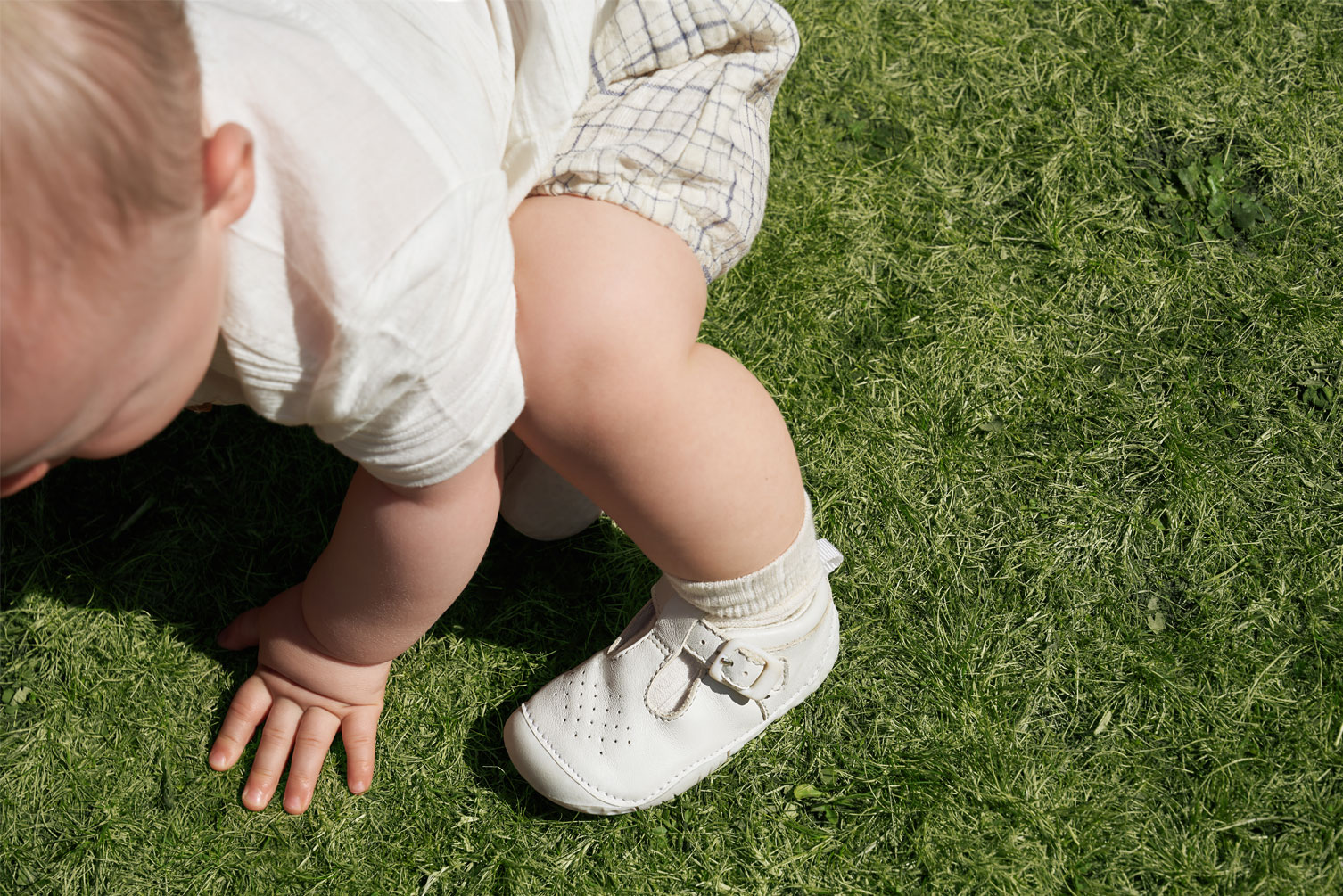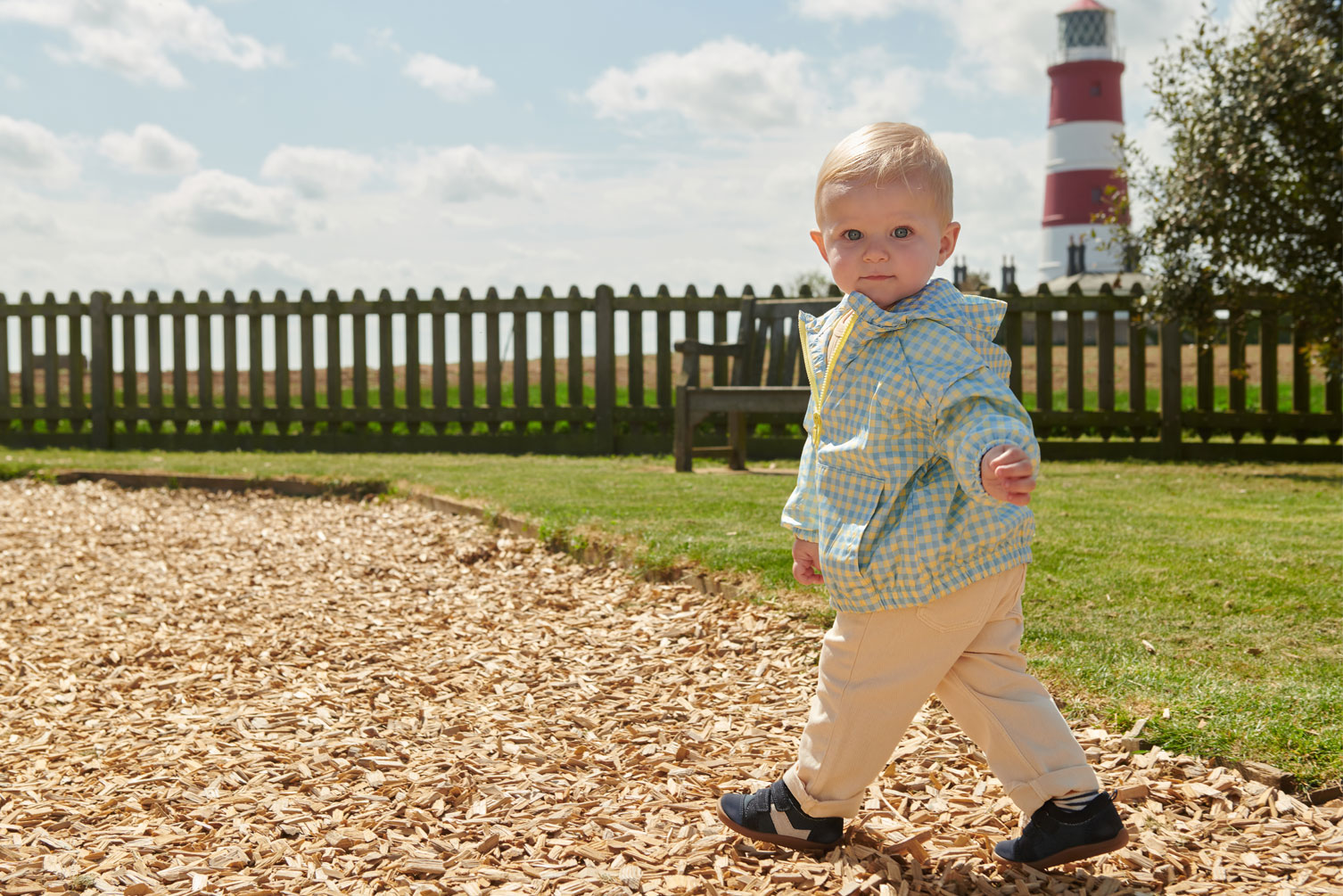
The first 12 months of a child’s life are filled with exciting milestones, all to be celebrated and captured in our hearts and memories for a lifetime. Those first steps, which are likely to come at around nine to 12 months, are incredibly precious and parents are always keen to capture and share them. However, not all children will start to walk at the same time, so it’s difficult to put a specific age on when this will happen. And it’s important to note that there’s nothing a parent can do to expedite the process. Every child is different and will follow their own, very unique path of development.
When a baby is only able to lie on its back and kick its legs, this stage is known by experts as the ‘Reflexive Period’. Within the first year, a baby will move into what is called the ‘Pre-adaptive period’ of gross motor development. This is the stage when they will start to control the position of their head and make voluntary movements such as reaching out for objects near to them. Within this period of development, when a child will usually be around six to nine months old, it is also likely to attempt to stand and take its first steps.
Once your child has mastered this significant milestone, they will develop their ability at pace! This period is called the ‘Fundamental Patterns’ period. At this point it’s very useful to your little one if they experience a broad array of movement opportunities to learn about their bodies and develop their spatial awareness. Securing new movements will help them to build confidence in their newfound capabilities and this will also help their brain to develop a positive relationship with exercise.
It’s important not to expect all children to walk at the same age, or expect too much too quickly. Allowing your child to build a steady confidence in its ability is far more important to its development than reaching their milestones early. To help your child develop strength in its leg muscles, hold them in a standing position and they will happily bounce up and down. Even sitting on their own will help them to develop core muscles, balance and control that will all contribute to preparing them to walk.
Please note, not all babies crawl! Some ‘bottom-shuffle’, sitting upright and pulling themselves along the floor, and others might just go straight to walking. The important thing to note is that the baby will need to have developed the right muscles, balance and coordination skills to take these first steps and your baby will do this at its own pace.
Confidence in early movement has been linked to a more enhanced confidence in later life, not just with more demanding physical activities or sports, but also emotional and academic confidence – simply a belief in your ability to achieve something and a positive relationship with your body. So, the more you can praise your child during these early days of movement and walking, then all the better for their developmental journey. A supportive environment will also give your child the confidence to try new things and, as they grow, develop a higher level of skill. This will become a natural response they can draw from if they pursue sports as they get older.
Falling is all part and parcel of the developmental journey and babies are well padded to take the gentle tumbles in life – and you’ll find nappies come into their own to add additional protection to little ones bumping up and down off the floor as they work hard to master those first steps!
Now is the time to secure your home from hazards. Cushion any sharp corners on tables and consider stairgates. If stairgates are not an option for you then stay with your little one as they approach the top of the stairs and gently turn them round so they are tummy to the floor, feet first down the stairs. You will be surprised how quickly they will establish that this is the way to come down the stairs quickly and without hurting themselves. Guide their feet at first, but quickly move to holding them secure by grasping the back of their clothes so that they can independently learn how to place their hands and knees on the stairs to keep themselves safe.
It’s a wonderful feeling helping your little one take those critical first steps. Once they are more confident toddling on their own, now is the time to give them some targets. There is a proven theory that giving young children targets within these early days of development will also help them to build super confidence in their ability to achieve. We suggest simple things like sitting in front of your child and stretching your arms out to give them a big hug when they achieve a few co-ordinated steps towards you. Take their favourite toy and encourage them to walk across the room towards it. Doing this, they will sub-consciously build their physical capability while also developing a confidence in their ability to achieve.
Many children will start their walking journey by ‘cruising’ around a room holding on to the furniture for reassurance while they develop their balance and co-ordination skills. This is a great way to help them but as they are still unsteady with an under-developed balance, ensure that any sharp corners are padded to avoid painful bumps.

When your child starts to explore the outdoors on two feet, then it’s time to look for more protection. At this stage the child needs to have lots of contact with the ground for their brain to form coordination skills. Shoes must allow natural movement with the right level of support and protection for toddlers’ unique soft and lightly structured feet. Start-Rite First Shoes support little feet that are learning and promise instant comfort, streamlined protection and perfectly positioned flexibility for all day freedom.
To ensure your toddler has the correct fitting shoes we recommend measuring their feet every 6-8 weeks until they start school. Read our blog, Is my child ready for shoes? if you have more questions about how to look after your little ones feet during this exciting stage of development.
Author: Vista, published 10-02-2023.